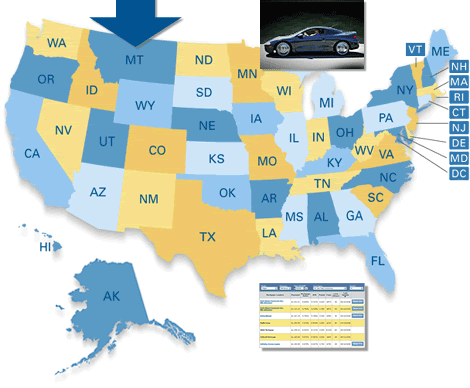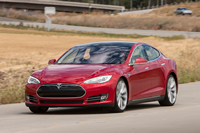Tussle Over Tesla: Two Controversies Bring Electric Cars into Question
by Amy Lillard
(4/15/2013) Tesla Motors is an exciting company with some exciting products. They’re at the forefront of the electric car market, advancing the car beyond its utilitarian function by creating luxury vehicles that happen to be electric. As a result, they’ve found major success: wait lists for purchases, positive press, and most recently, the 2013 Motor Trend “Car of the Year” award.
But some recent controversies and business moves threaten this good standing. And the fallout may call into question not only the success of the company, but also the outlook for the entire electric car market.
Range Review
Tesla Motors was formed in 2003 by a group of entrepreneurs including current Chairman Elon Musk. Today they offer the Model S, X, and Roadster, with reviews bordering on ecstatic.
Of course, Tesla has had to content with worries and misconceptions from the public regarding electric vehicles in general. The driving range in particular has been cited as a major issue preventing buyers from seeing the electric car as a truly viable option for their lifestyle — most electric cars require a recharge after around 100 miles, and Tesla says their Model S has a range of 265 miles. Additionally, consumers wonder about the lack of charging stations available for electric cars. While there is a gas station on every corner, as of yet there is less public infrastructure supporting electric vehicle recharging.
It’s these two issues that came to a head in a New York Times article in February. Reporter James Broder drove a Tesla Model S sedan along the East Coast between two Tesla Supercharger electric stations in Delaware and Connecticut. In his article, he stated the Model S lost charge much faster than it should have, forcing him to drive slower and turn down the heat. Eventually the car ran out of charge and had to be towed to the charging station. It was a scathing review and account, one that Musk immediately refuted.
That’s when things got interesting. Musk contended that Broder essentially faked the article on a quest to make Tesla look bad. “When the facts didn’t suit [Broder’s] opinion, he simply changed the facts,” said Musk in a rebuttal on the Tesla blog.
Musk then released data logs from the test drive that showed the trip included speeding and an unplanned detour, which drained battery power. At the same time, other reporters and even individual drivers recreated the test drive to success, tweeting, blogging and writing about their experiences across the Internet. A fellow Times reporter also took her colleague to task for making casual and imprecise notes of his journey, although stopping short of suggesting Broder intentionally sought to create a negative review.
The back and forth has continued, with Tesla increasingly seen as the victor. But the damage was done — the tussle drove down the company’s share price, and has brought to the forefront all the concerns drivers have about electric cars. Ultimately, today’s electric cars require more planning and commitment than gas-powered cars. This high-profile battle showed that.
Finance Folly
On the heels of this dustup, Tesla has had many people jump to their defense in the press and the web. But that began to change with Musk’s announcement in early April of a too-good-to-be-true new financing offer for potential Tesla customers.
The deal, purported to combine the best of car ownership with leasing, created a new kind of financing option for Model S buyers. The car currently retails starting at $69,000. Through US Bank or Wells Fargo, customers could provide a 10 percent down payment, covered by federal and state tax credits. After 36 months, customers have the right to sell their Model S for the same residual value percentage as the Mercedes S class.
The announcement came with the assertion that customers could ultimately pay $500 per month in out-of-pocket costs, after considering savings from using an electric car.
It was this last bit of marketing that immediately sent recoils and negative response through the Internet. After reading the fine print, reporters and individuals discovered that actual monthly payments would be around $1,200 for customers with excellent credit. The calculator posted on the Tesla website utilized a series of “math that even Wall Street would find fishy,” said Car and Driver magazine:
• $100 per month for cutting out gas station trips 4 times a month
• $167 per month for saving time driving in the carpool lane (a right given to electric cars)
• $225 per month for a business tax break for leasing (which is NOT exclusive to electric cars)
• $200 per month in gas savings
At the least, said many reviewers and reporters, the information and financing arrangement are confusing. But more than that, said many reports, the deal was downright misleading or “deceptive” (Car and Driver), with “dicey” math (Atlantic).
In addition, other details of the deal were flawed. The use of tax credits for a down payment comes with a major issue, for example. Federal credits come on your next tax return, meaning you’ll need to shell out the down payment first and get refunded up to two years later.
Ultimately, the announcement and the flawed marketing may hurt a car that’s otherwise seen by many as pretty cool.
Tesla Truth
These two recent controversies have done a few things. They’ve demonstrated, perhaps to his detriment, Musk’s bombastic nature. With the Times review, Musk’s brash response was seen as positive, a creator sticking up for his creation against the big bad giant. But with the recent financing announcement, bombast turned to hype and a flexibility with the truth. And that could hurt public opinion of Musk and the company.
Unfortunately, that could hurt electric vehicles as well, which are poised on the cusp of mass market adoption.
Other related articles:
Why We Need to Fight for Tesla
The New Frontier: Hydrogen Fuel Cell Cars
Five Drawbacks of Electric Cars
Top 5 Reasons to Buy an Electric Car
Electric Cars: Is it Right for You?
Electric Cars: Buying Considerations
Electric Cars: Top 5 Things to Know
Automotive Loans: Applying for a Car Loan
High MPGs and low auto loan rates can save you thousands of dollars
Research your options when shopping for an auto loan
New and Used Auto Loan Rates
Choose Your State Below

Start by selecting your state

Amy Lillard
The ERATE® Resource Guide to No-Closing-Cost Refinancing
Principal Reduction: New Programs, More Controversy
Understanding Mortgages: Mortgage Paperwork
Understanding Mortgages: Types of Mortgages
Understanding Mortgages: How to Get a Mortgage
Understanding Mortgages: Buy or Rent?
Understanding Mortgages: Working with a Real Estate Agent
Understanding Mortgages: Working with a Real Estate Agent

Automobile Buying/Financing
5 Steps to Find the Perfect Car
Auto loan defaults to rise 7 percent in 2010
Auto Show Season Tips for Buyers
Consumer Reports suspends recommendations for Toyota's recall models
When is the Best Time to Buy a New Car?
Making a Vehicle Purchase? Enjoy These Helpful Tips
Chances are, your next car will be used. Drive a hard bargain
What your car is really saying
2012 President's Day auto sales among best ever
Special Report: Hitting the Brakes on Auto Dealer Loans
Auto Insurance
Buying Ins - Shopping for Insurance
Best Car Insurance Plan for You


